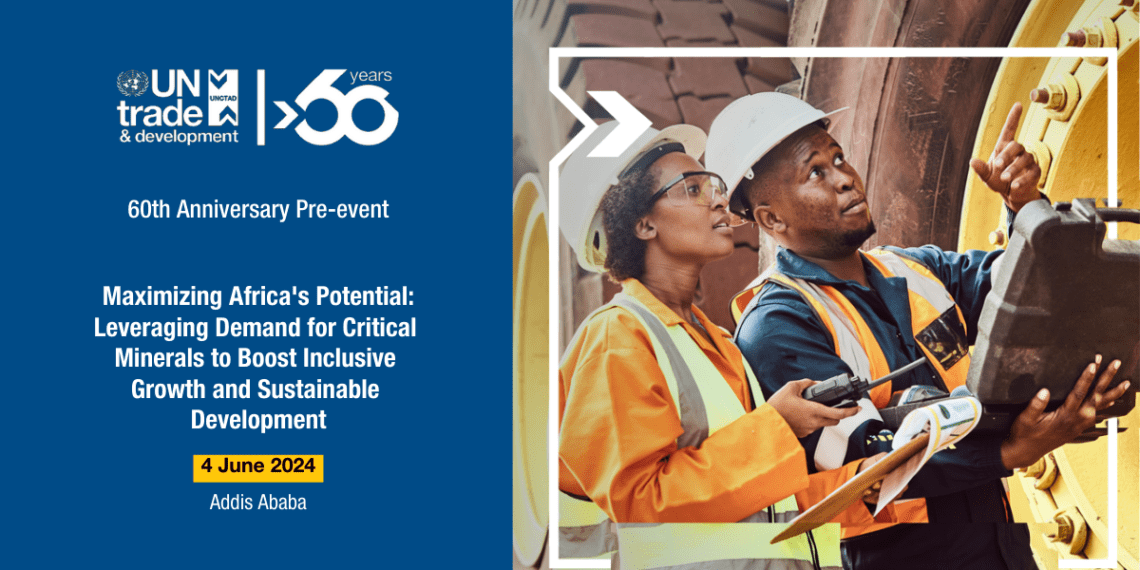As the United Nations Conference on Trade and Development (UNCTAD) gears up to mark its 60th anniversary in June 2024, the organization is set to host a landmark Global Leaders Forum in Geneva, Switzerland. This significant milestone will be celebrated under the theme “Charting a New Development Course in a Changing World,” reflecting the evolving landscape of international trade and development.
As a precursor to the anniversary celebrations, UNCTAD and ECA will host a joint pre-event in Addis Ababa on June 4, 2024, titled “Maximizing Africa’s Potential: Leveraging Demand for Critical Minerals to Boost Inclusive Growth and Sustainable Development.” This gathering will bring together African leaders to explore the opportunities in the green minerals sector and its role in supporting Africa’s development. The discussions will draw from established frameworks such as the Africa Mining Vision and Africa Green Minerals Strategies.
“The pre-event will explore the opportunities and resources in the ‘green’ minerals sector for supporting Africa’s development. It will build on established frameworks agreed by Member States to maximize the developmental impact of mineral endowments, namely the Africa Mining Vision, Africa Green Minerals Strategies, and various sub-regional and national policies.”
Economic Commission for Africa; African Minerals Development Centre
The discussions will focus on how to capitalize on the critical minerals boom to support Africa’s energy and mineral-industrialization needs, raise revenues, and promote value addition. The event will build on frameworks such as the Africa Mining Vision and the Africa Green Minerals Strategy, exploring how these initiatives can drive economic transformation and reduce vulnerability to commodity price fluctuations.
The initiatives by UNCTAD and ECA are set to transform Africa’s economic landscape by providing the necessary support to harness its mineral resources effectively. By addressing challenges such as limited financing and lack of infrastructure, these efforts will enhance the continent’s capacity for value addition and integration into global markets.
The focus on critical minerals will not only boost government revenues but also create jobs, stimulate economic growth, and contribute to the overall sustainable development of African nations.
Africa’s mineral resources present a significant opportunity for economic development. For instance, the Democratic Republic of Congo (DRC) produces over two-thirds of the world’s cobalt, and South Africa holds the largest reserves of manganese globally.
However, African countries face numerous challenges, including limited and volatile development finance. UNCTAD estimates that the annual financing gap for developing countries to meet the Sustainable Development Goals (SDGs) is approximately $4 trillion.
To bridge this gap, it is essential to maximize the financial and developmental benefits from natural resources. Currently, African countries generate only about 40% of the potential revenue from these resources, primarily due to issues like transfer pricing and profit shifting. Addressing these issues and increasing domestic value addition can significantly boost government revenues and economic diversification.
The event will also tackle the challenges faced by African countries in revenue generation and value addition in the minerals sector. By examining these issues, participants will seek ways to enhance the sector’s contribution to sustainable development and mitigate risks associated with financial volatility and debt. The involvement of UNCTAD, ECA, and other key partners will be crucial in formulating strategies to address these challenges effectively.
The outcomes of these discussions will have far-reaching implications for African countries, potentially shaping policy directions, investment strategies, and partnerships aimed at fostering sustainable development. By focusing on the ‘green’ minerals sector, the events underscore the critical role of responsible resource management in achieving prosperity for all, reinforcing the centrality of sustainability in Africa’s development agenda.
READ ALSO: CSOs Urged to Probe Political Promises in Ghana’s Healthcare Sector























